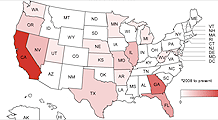Two more banks fail: 25 in 2009
American Sterling Bank of Sugar Creek, Missouri, and Great Basin Bank of Nevada in Elko, Nevada were shuttered Friday. The closures should cost the FDIC an estimated $84 million.
NEW YORK (CNNMoney.com) -- Two more banks failed Friday bringing the tally to 25 in 2009, according to the government.
American Sterling Bank, based in Sugar Creek, Mo., and Great Basin Bank of Nevada in Elko, Nevada were shuttered by the Office of Thrift Supervision and the Federal Deposit Insurance Corporation was named receiver, according to statements posted on the FDIC's Web site.
American Sterling Bank had total assets of approximately $181 million and total deposits of $171.9 million as of March 20, according to the release.
Metcalf Bank, headquartered in Lee's Summit, Mo., will assume all of the deposits of the failed bank.
In addition to taking over all of the deposits, Metcalf Bank will purchase approximately $173.6 million in assets, leaving a small remainder for the FDIC to dispose of later.
The bank failure will cost the Deposit Insurance Fund approximately $42 million, according to the FDIC.
The offices of the failed bank located in Missouri will reopen on Saturday, while the offices in California and Arizona will reopen on Monday as branches of Metcalf Bank. Depositors of the shuttered bank will automatically become depositors of Metcalf Bank.
Great Basin Bank of Nevada had total assets of $270.9 million and total deposits of $221.4 million as of December 31, according to the release.
Nevada State Bank of Las Vegas will assume all the deposits of the closed bank, and the five offices of Great Basin Bank of Nevada will reopen on Monday as branches of Nevada State Bank.
The bank failure will cost the Deposit Insurance Fund approximately $42 million, according to the FDIC.
Through the weekend, customers of the failed banks can access their money by writing checks or using ATM or debit cards. Checks drawn on the banks will continue to be processed and loan customers should continue to make their payments as usual.
The FDIC will continue to fully insure individual accounts up to $250,000 through the end of 2009.
The recession has hit regional banks very hard, as spiking unemployment rates made it hard for homeowners to make payments on their mortgages. Meanwhile, plummeting home prices devalued mortgage-backed assets. In 2008, a total of 25 banks failed.
Banks became afraid to lend for fear of not getting their cash back, and the already stalled economy became really stuck in the mud as pipelines of credit froze up.
The federal government stepped in with an unprecedented series of bailouts for the economy and the nation's financial system in an effort to restore confidence and jumpstart lending. The nation's biggest banks received the heftiest injections of capital.
The amount that the bailed out banks have been lending has been closely watched. According to a report from the Treasury released Wednesday surveying the the top 21 recipients of government investment through the Capital Purchase Program (CPP), bank lending fell by 2% in February compared with the month prior.
Nine banks reported an increase in lending in the month, but 12 reported a decrease. The report indicated that banks have been lending more in the form of home mortgage lending, but less in the form of commercial and industrial lending.
This week also brought a slew of earnings reports from some of the biggest banks. Thursday, JPMorgan Chase (JPM, Fortune 500) reported a better-than-expected profit of $2.1 billion in the first quarter and CEO Jamie Dimon said that the bank would like to pay back the government's loans as soon as possible. Friday, Wall Street titan Citigroup (C, Fortune 500) posted better results than expected. Bank of America (BAC, Fortune 500) is due to report its latest quarterly earnings Monday.
As part of the government's plan to have its finger closer to the pulse of the financial system, the Obama administration has been conducting "stress-tests" on the nation's banks to determine how well prepared they are to survive further economic turmoil. The government confirmed that it will be making public the results from some of the stress tests currently being conducted on 19 big banks. ![]()


